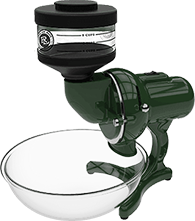Research commercial or home flour milling and it won’t be long before you find information on the impact of heat on flour. Some claim that high-temperature milling reduces or destroys enzymatic activity. Others argue that flour will be heated when cooked; therefore, milling temperature is a moot issue. The concern for healthy flour is the very reason Dr. Lee invented the Lee Household Flour, so we wanted to address this topic.
The Flour Milling, Baking and Confectionery Technology Department at the Central Food Technological Research Institute found that some loss of essential fatty acid and amino acids occurs at milling temperatures >170oF.
If you are concerned with the temperature of your milled flour, one recommendation is to freeze your grains before milling in order to reduce output temperatures.
We’ve sampled flour temperatures made from the Lee Household Flour Mill and measured the following temperature rise:
Hard red wheat: 35oF
Corn: 26oF
Garbanzo beans: 15oF

